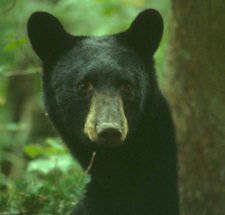 As New York’s black bears emerge from their winter dens, they need to replenish their nutrients and body fat. Nearly all negative bear encounters in New York are the result of hungry bears being attracted to human food sources, primarily garbage and bird feeders. Bears often find human food readily accessible if homeowners don’t take precautions and these food sources can turn any bear into a problem bear.
As New York’s black bears emerge from their winter dens, they need to replenish their nutrients and body fat. Nearly all negative bear encounters in New York are the result of hungry bears being attracted to human food sources, primarily garbage and bird feeders. Bears often find human food readily accessible if homeowners don’t take precautions and these food sources can turn any bear into a problem bear.
To reduce the chance of negative black bear encounters, take these simple precautions:
- Never feed bears! It is illegal, dangerous and detrimental to bears.
- If you know of bears being fed or of a nuisance bear situation, report to DEC immediately.
- Take down bird feeders after April 1. Birds don’t need supplemental food in the spring and summer, when natural foods are most abundant.
- Clean off barbeque grills before nightfall, and if possible, store grills inside.
- Store garbage in a sealed can inside a secure building or location, and dispose of garbage frequently.
- Put garbage containers by the curb just before the scheduled pick-up, never the night before.
- Consider using a certified bear-resistant garbage container.
- Clean garbage cans frequently with ammonia products.
- Do not burn garbage: it is illegal and can attract bears.
- Do not add meat scraps, bones or melon rinds to your compost pile.
- Feed pets indoors and store pet food indoors. If pets must be fed outside, immediately remove all uneaten food and dishes.
Please report problems with black bears to the Regional Wildlife Offices. To learn more about New York’s black bears, visit the DEC Website.
